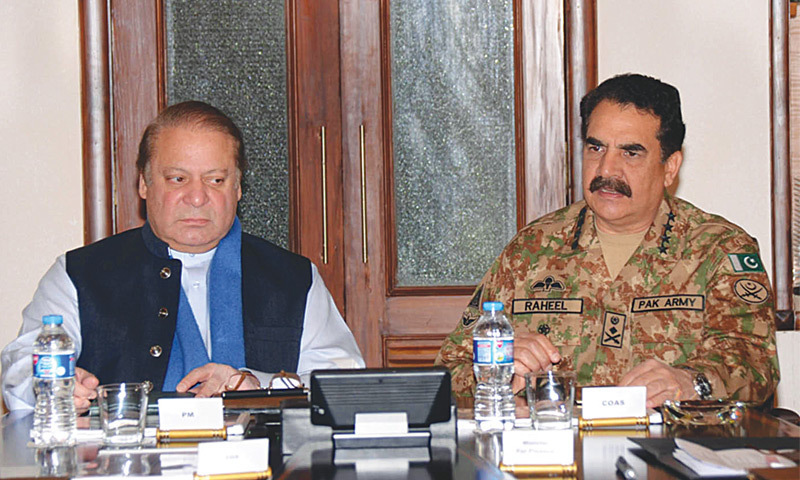Prime Minister Nawaz Sharif and army Chief General Raheel Sharif arrived in Karachi earlier today to review the overall law and order in the city and the rest of Sindh.
Nawaz Sharif and Chief Minister Sindh Qaim Ali Shah are meeting at the Governor’s House.
The Army chief at Corps Headquarters in Karachi chaired a meeting to review security.
The meeting was attended by Corps Commander, Director-General (DG) Inter-Services Intelligence and the DG Rangers.
Prime Minister Nawaz Sharif attends the Air Force event in Sonmiani.
The Interior Minister Chaudhry Nisar had earlier announced that he and Nawaz would be in attendance at the meeting, which will also be attended by Sindh Governor Dr. Ishratul Ibad, Chief Minister Syed Qaim Ali Shah, Home Minister Sohail Anwar Sial and top military officials, including the Karachi corps commander, the Sindh DG Rangers and the heads of other law-enforcement agencies.
The purpose of Nawaz’s visit will be to sort out the issue of the Rangers’ deployment in Karachi, the term of which expired Sunday.
According to earlier reports, there are differences between the federal and Sindh governments over extending the paramilitary forces’ mandate.
On Sunday, Nisar expressed regret that Sindh had not decided on the Rangers’ deployment over the past two weeks.
“They should have done it by Saturday,” he had remarked, insisting that Rangers could not be left in the province without legal cover and would be pulled out if no extension was given. The decision, he noted, ultimately lay with the provincial government.
PM Nawaz Sharif arrived in Karachi to attend a high-level meeting on the law and order situation.
PPP spokesperson Senator Farhatullah Babar told the media that no decision would be taken on Rangers’ continued deployment in the province unless the Sindh government approved it.
“The responsibility and the power to extend the mandate of Rangers rests with the provincial government,” he said.
The PPP has been complaining about Rangers’ activities, especially after they acted against alleged irregularities and corruption in the land department of the provincial government.
MQM leader Farooq Sattar said that although his party had not opposed the operation against terrorism and extremism, it had some reservations over cases where Rangers had acted against their mandate.
He said a meeting of senior MQM leaders would also be held today to review the situation against the backdrop of the proposed extension of Rangers’ deployment.
MQM’s Farooq Sattar believed that the governments at the center and in Sindh should take all stakeholders on board so that a unanimous decision could be taken.
Rumors that the PPP was unwilling to give the Rangers an extension in Karachi have been doing the rounds since the party began delaying a decision.
Sources in the Sindh government said that while the provincial government may agree to extend Rangers’ deployment in Karachi, it would ask the federal government to revisit its mandate.
The federal government gave special powers to Rangers in Karachi in June 2015, under the Anti-Terrorism Act, to arrest anyone found involved in violence.
The arrest of PPP leader Dr. Asim Hussain for his alleged role in terror financing is one of the most high-profile examples of Rangers exercising their special powers.
The Rangers are currently leading an operation against criminal elements in Karachi, which completed two years in September this year.
The ‘operation’ against criminal elements in Pakistan’s commercial hub was initiated back in September 2013 after the federal cabinet empowered Rangers to lead a targeted advance with the support of police against criminals already identified by federal military and civilian agencies for their alleged involvement in targeted killings, kidnappings for ransom, extortion and terrorism in Karachi.
A high-level apex committee meeting chaired by the Chief of Army Staff, Gen Raheel Sharif, on May 14, 2015, decided to implement effective policing and surveillance in the “vast suburbs of Karachi” to prevent what the military spokesperson described as “sneaking terrorist attacks.”
The second phase of the Karachi operation was launched in early November. Rangers said terrorists, contract killers and their facilitators involved in attacks on LEA personnel, “especially police, lawyers and witnesses,” would be arrested during this phase, and such elements would be eliminated.
Police sources have said that three elements — a political party, banned sectarian outfits and hired assassins — were responsible for the recent killings of the law enforcers in the metropolis.
They also said that police officers were being targeted to undermine the perceived effectiveness of the Karachi operation since the number of targeted killings had dropped to one or two from 8-10 per day.
In late November, Interior Minister Chaudhry Nisar Ali Khan hinted that the security forces’ operation against criminals in Karachi would be expedited and pursued till its logical conclusion.






